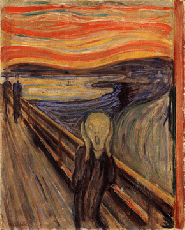This piece was reprinted by OpEd News with permission or license. It may not be reproduced in any form without permission or license from the source.
From Caitlin Johnstone Website

The Scream by Edvard Munch
(Image by (Not Known) Wikipedia (commons.wikimedia.org), Author: Author Not Given) Details Source DMCA
As 2020 gets crazier and crazier, emotional self-care is getting more and more important. A lot of people, especially the "plugged-in" types who like to pay close attention to what's going on in the world, are getting into some looping stress patterns over the Covid-19 pandemic that are unnecessary, unhealthy, and unhelpful.
It's an understandable web to get tangled in; there are all these alarming news stories and statistics pouring in every single day, many of which speak of dangers which may pose a direct threat to the lives and livelihoods of ourselves and our loved ones. Some people spend hours online combing through all the latest information they can find about this thing, and as they're doing this, a tremendous amount of stress builds up in the background of their experience, ultimately culminating in depression, panic attacks, angry outbursts, substance abuse or other unpleasantness.
You see strategies for coping with this increasingly common problem everywhere online, from common healthy stress management techniques like deep breathing and meditation, to escapist claims that the virus doesn't pose any real danger, to many people simply unplugging from their news feeds altogether. What people aren't talking about nearly enough, in my opinion, is the simple yet highly effective practice of consciously feeling your feelings.
You wouldn't think "feel your feelings" is something that needs to be said; it sounds not just like common sense, but like something that happens automatically without your intention or permission. We've all experienced emotions we'd prefer not to experience if given the choice, so we assume emotion arises unbidden like a force of nature.
While that can certainly be true, a tremendous range of our emotional spectrum is often blotted out by a basic lack of emotional attentiveness. Our culture tends to encourage us to put all but our loudest emotions on the back burner and focus on other matters, and Covid-19 happens to feed into that dynamic especially well by giving us a bunch of sparkly news headlines and statistics to focus on while this low-level background anxiety slowly builds unnoticed.
Feelings need to be felt. Not acted out on other people, but felt. They're like small children; if you just give them a cuddle, let them cry and listen to their grievances they feel better in a few minutes, but if you deprive them of attention they'll start acting out to get it.
At some point between childhood and adulthood, most of us consciously created strategies to stop our feelings from coming up unbidden. At some point, crying in front of your peers became embarrassing and you learned how to stop it from happening. Most of us never thought to take down those defenses after they were installed. Some of us have never even re-learned how to cry again. Letting your feelings flow again will take a conscious effort from most of us.
No matter how much mantra repetition, deep breathing or positive affirmations you do, unless you've felt those feelings all the way through, you're just wallpapering over the actual issue. A huge percentage of the anxiety that people are currently experiencing is just a big backlog of feelings that need to be felt.
For some of you, just reminding you of that will be enough. Put down the phone and quietly meditate on it until it bubbles up. Hold your feelings like they're a little baby newborn. Let them happen until they're all the way done.
Others might need to try out some different strategies. Here are some of mine.
First, I always check in with my body. Am I clenching anything? Hands, bum, tummy, forehead, jaw? What else is happening? Is there background nausea, or a lump in my throat, or is my heart thumping too hard? I investigate. Close your eyes now and try it with me. Scan around for a few minutes.
Try tapping around with the tips of your fingers on one hand of the areas that you identified are tight. You'll find spots that are a little bit sore. They feel like a light bruise. Tap on those spots for a little longer until they release. Once you've done that, let your fingers tap around your body and find other tight spots. Do this for at least a few minutes.
As you're doing this, the loud buzz of anxiety releases and the actual root feelings become more clear. Sometimes all you have to do is feel them. You will probably feel embarrassed to feel them. That's just one of the layers of defense you put in all those years ago. If it feels stuck, use your theater improv skills to exaggerate and try some feelings on until you find the source feeling. Feel them all the way through. Sometimes they feel their way to the other side, oftentimes they end abruptly with a burp, the shakes, a yawn or some other release.
(Note: You can view every article as one long page if you sign up as an Advocate Member, or higher).





